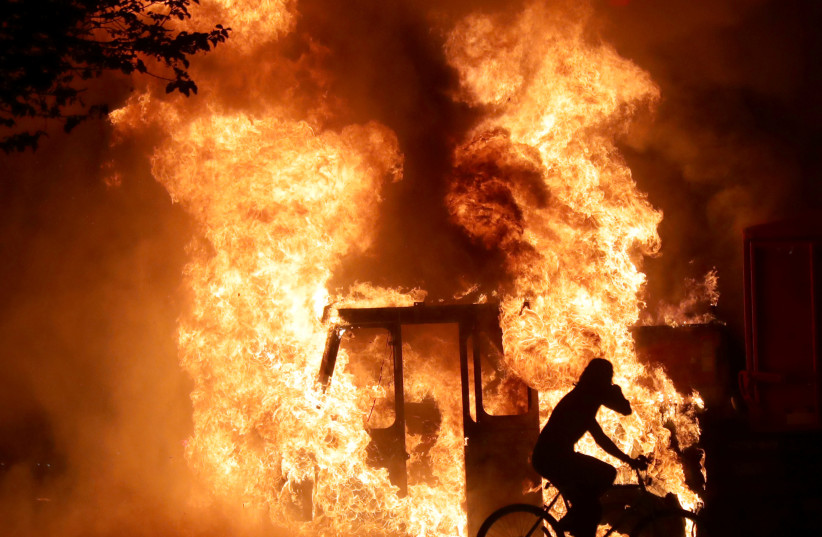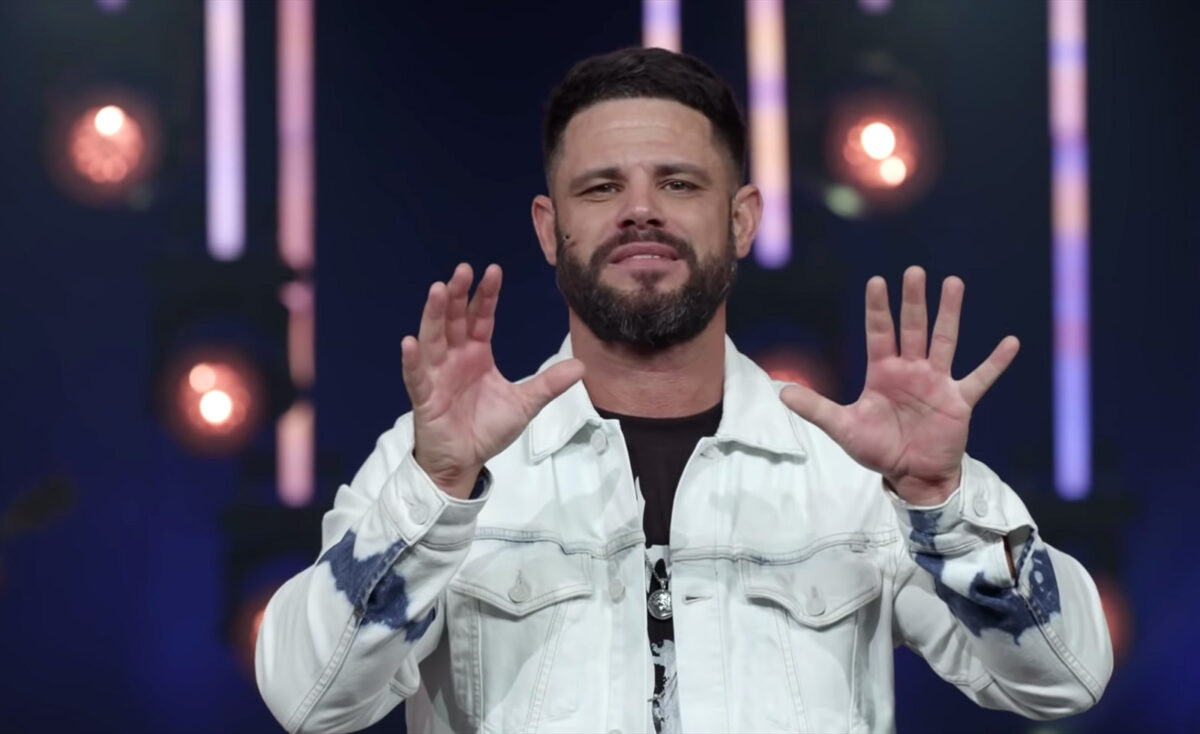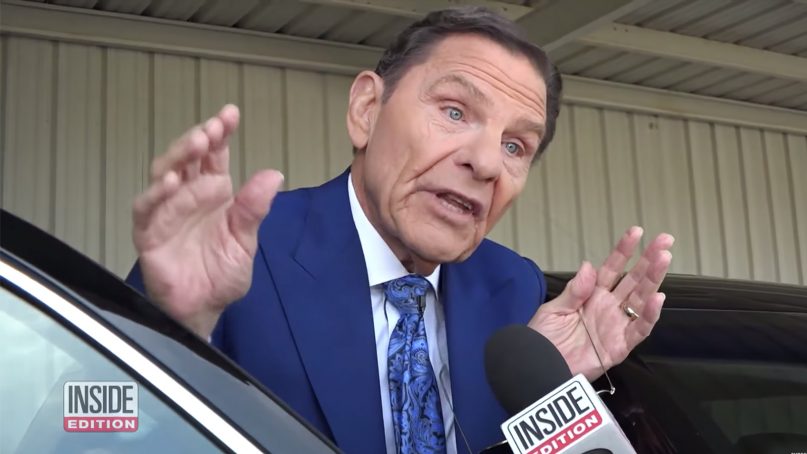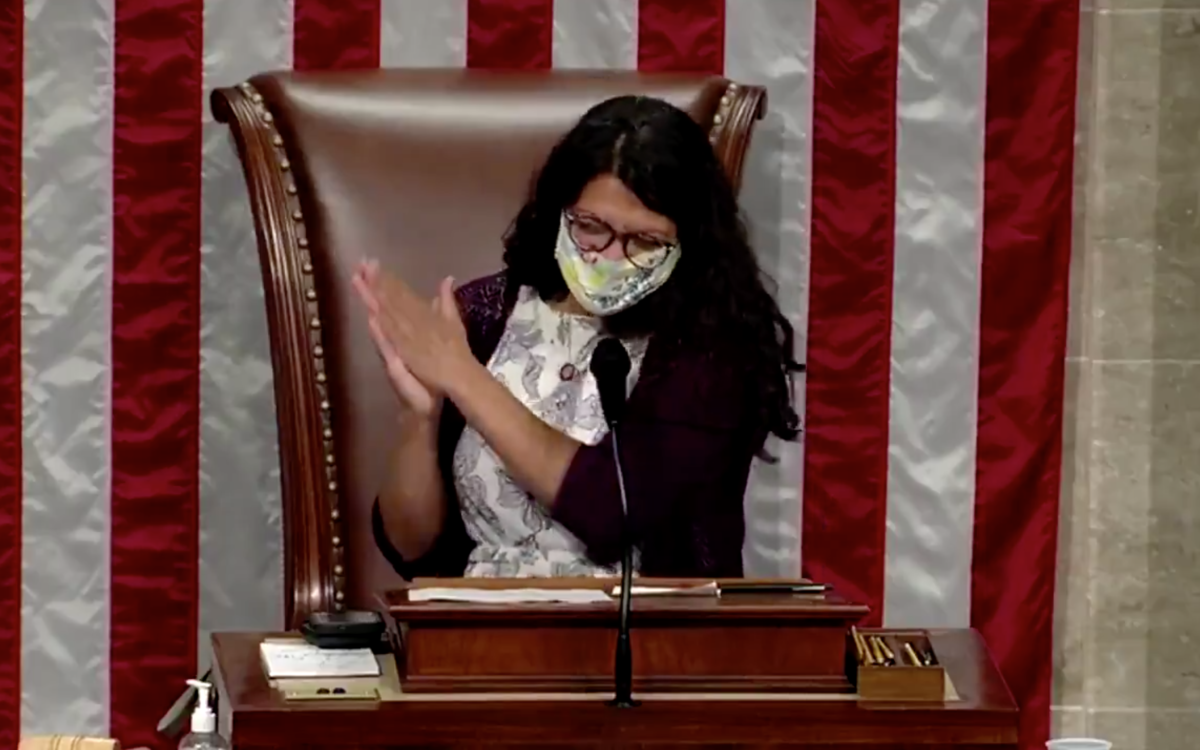Coronavirus missteps from CDC and FDA worry health experts
"If you don't trust the agencies that are telling you to do this, then you don't have your key weapons to fight against a pandemic," one doctor said.
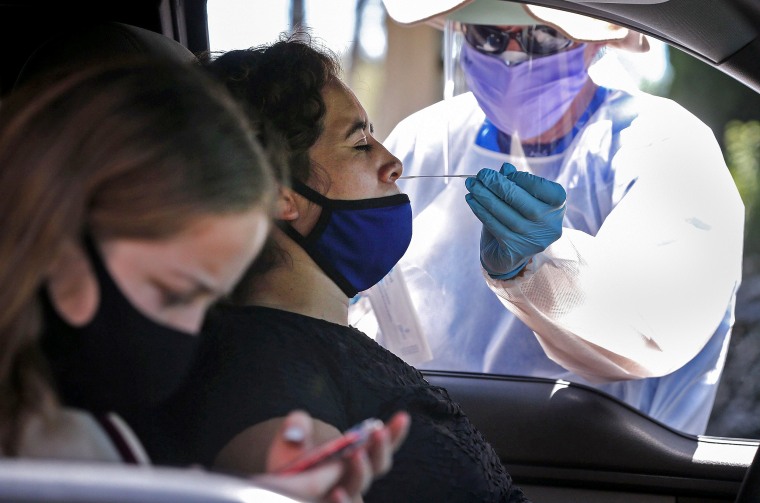
A health care worker helps a motorist with a nasal swab test at a drive-in coronavirus testing center at M.T.O. Shahmaghsoudi School of Islamic Sufism in Los Angeles on Aug. 11.Mario Tama / Getty Images file
Aug. 31, 2020 By Denise Chow
Dr. Stephen Hahn, the embattled head of the Food and Drug Administration, offered an assurance Monday: Any vaccine for public use will be approved "on the basis of science and data."
"We will not make that decision on the basis of politics," he said in an interview with "CBS Evening News." "That's a promise."
Hahn made the pledge after a series of recent public missteps involving the FDA and the Centers for Disease Control and Prevention — two of the federal agencies critical to the U.S. coronavirus response — which have damaged their reputations at a time when they are needed the most, according to seven prominent doctors and scientists who spoke to NBC News. They say that the recent events are clear signs of political interference from the White House and that they have shaken their trust and confidence in the leadership of the agencies.
"It's an enormous scandal," said Carl Bergstrom, a biologist at the University of Washington who has become an outspoken critic of the U.S. pandemic response and has written extensively about misleading health information. "What it looks like at this point is you have a White House altering public health advice to improve election chances to the detriment of American lives."
In an interview published Sunday in The Financial Times, Hahn said the FDA could fast-track a coronavirus vaccine by issuing an emergency use authorization before the end of Phase 3 clinical trials. The comments were met with an outcry from public health experts, prompting him to clarify in the CBS interview that a vaccine wouldn't be politicized.
Before that, Hahn misrepresented data about convalescent plasma, leading him to apologize for having overstated the potential treatment's benefits. He also ousted the agency's chief spokesperson over the fiasco, The New York Times reported.
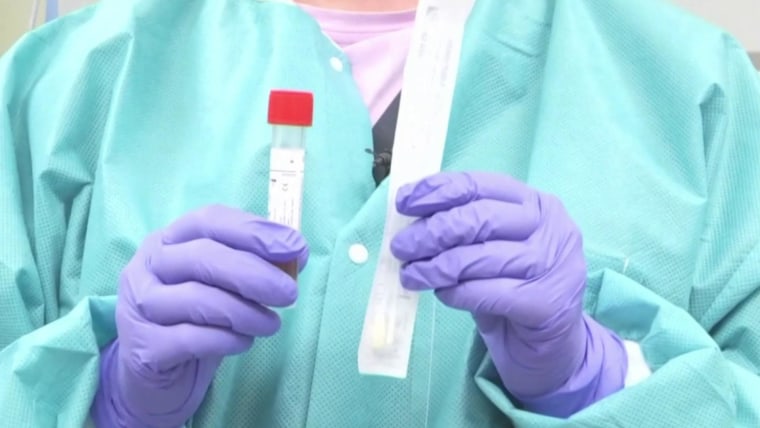
FDA head open to authorizing a COVID-19 vaccine before end of Phase 3
Aug. 31, 2020 By Denise Chow
Dr. Stephen Hahn, the embattled head of the Food and Drug Administration, offered an assurance Monday: Any vaccine for public use will be approved "on the basis of science and data."
"We will not make that decision on the basis of politics," he said in an interview with "CBS Evening News." "That's a promise."
Hahn made the pledge after a series of recent public missteps involving the FDA and the Centers for Disease Control and Prevention — two of the federal agencies critical to the U.S. coronavirus response — which have damaged their reputations at a time when they are needed the most, according to seven prominent doctors and scientists who spoke to NBC News. They say that the recent events are clear signs of political interference from the White House and that they have shaken their trust and confidence in the leadership of the agencies.
"It's an enormous scandal," said Carl Bergstrom, a biologist at the University of Washington who has become an outspoken critic of the U.S. pandemic response and has written extensively about misleading health information. "What it looks like at this point is you have a White House altering public health advice to improve election chances to the detriment of American lives."
In an interview published Sunday in The Financial Times, Hahn said the FDA could fast-track a coronavirus vaccine by issuing an emergency use authorization before the end of Phase 3 clinical trials. The comments were met with an outcry from public health experts, prompting him to clarify in the CBS interview that a vaccine wouldn't be politicized.
Before that, Hahn misrepresented data about convalescent plasma, leading him to apologize for having overstated the potential treatment's benefits. He also ousted the agency's chief spokesperson over the fiasco, The New York Times reported.

FDA head open to authorizing a COVID-19 vaccine before end of Phase 3
AUG. 31, 202001:19
The CDC sparked its own crisis when it inexplicably changed its guidance on COVID-19 testing in a way that ran contrary to the best available scientific evidence, Bergstrom said. The updated recommendations, posted on the agency's website Aug. 24, suggested that people exposed to the coronavirus "do not necessarily need a test" unless they exhibit symptoms, are older or have existing medical needs that make them especially vulnerable to the virus.
But it has been known that infected people can be contagious before they experience symptoms and that people can also spread the virus even if they remain asymptomatic.
The CDC's director, Dr. Robert Redfield, backtracked and issued a statement saying that "all close contacts of confirmed or probable COVID-19 patients" may consider getting tested.
Loren Lipworth, an epidemiologist at Vanderbilt University Medical Center in Nashville, Tennessee, said the recent developments are troubling because they undercut the CDC's mission.
"As epidemiologists, the CDC has always been who we turn to for guidance and for the data," she said.
Bergstrom said anything that compromises clear public health messaging could be very damaging, especially because scientists learn new things about a virus and its effects on humans as a pandemic evolves. About eight months into the worst pandemic in more than a century, research has shown that staving off the coronavirus relies on three pillars that work in concert: testing widely, social distancing and wearing masks.
"If you don't trust the agencies that are telling you to do this, then you don't have your key weapons to fight against a pandemic," he said.
With the FDA commissioner's blunder, Lipworth said, it's particularly important for the person leading the agency responsible for overseeing the development of potential coronavirus treatments and vaccines to convey information correctly.
The CDC sparked its own crisis when it inexplicably changed its guidance on COVID-19 testing in a way that ran contrary to the best available scientific evidence, Bergstrom said. The updated recommendations, posted on the agency's website Aug. 24, suggested that people exposed to the coronavirus "do not necessarily need a test" unless they exhibit symptoms, are older or have existing medical needs that make them especially vulnerable to the virus.
But it has been known that infected people can be contagious before they experience symptoms and that people can also spread the virus even if they remain asymptomatic.
The CDC's director, Dr. Robert Redfield, backtracked and issued a statement saying that "all close contacts of confirmed or probable COVID-19 patients" may consider getting tested.
Loren Lipworth, an epidemiologist at Vanderbilt University Medical Center in Nashville, Tennessee, said the recent developments are troubling because they undercut the CDC's mission.
"As epidemiologists, the CDC has always been who we turn to for guidance and for the data," she said.
Bergstrom said anything that compromises clear public health messaging could be very damaging, especially because scientists learn new things about a virus and its effects on humans as a pandemic evolves. About eight months into the worst pandemic in more than a century, research has shown that staving off the coronavirus relies on three pillars that work in concert: testing widely, social distancing and wearing masks.
"If you don't trust the agencies that are telling you to do this, then you don't have your key weapons to fight against a pandemic," he said.
With the FDA commissioner's blunder, Lipworth said, it's particularly important for the person leading the agency responsible for overseeing the development of potential coronavirus treatments and vaccines to convey information correctly.
OPINION
FDA chief apologizes for his COVID-19 plasma exaggeration — but the damage is done
The situation has only furthered concerns that the agencies have been politicized. The spokesperson who was let go from the FDA was previously a reporter for One America News Network, a far-right media outlet that has been a strong supporter of President Donald Trump.
Beyond the obvious dangers of mischaracterizing data about a potential treatment, Lipworth said, it's still too early to know whether convalescent plasma is, in fact, beneficial. While the therapy has been shown to be safe, clinical trials to test its effectiveness continue, including at Vanderbilt University.
"The evidence is certainly not conclusive whether or not Dr. Hahn communicated it correctly," she said. "But even if he had, we're still not at a point where we can say there's conclusive evidence of the benefits."
All of the doctors and public health experts who spoke to NBC News expressed concern that Hahn's misrepresentation could tarnish the FDA's reputation. The erosion of trust could be especially problematic at the FDA, the agency responsible for evaluating the safety and effectiveness of vaccine candidates, said Dr. Stanley Perlman, a professor of microbiology and immunology at the University of Iowa.
"It's a real worry, especially when we have people who don't trust the government and don't want vaccines and barely believe that this virus is causing a problem," he said.
Dr. Steven Goodman, a professor of epidemiology and medicine at Stanford University, said the recent incidents may cause people to question the motives of the federal agencies that respond to public health emergencies.
FDA chief apologizes for his COVID-19 plasma exaggeration — but the damage is done
The situation has only furthered concerns that the agencies have been politicized. The spokesperson who was let go from the FDA was previously a reporter for One America News Network, a far-right media outlet that has been a strong supporter of President Donald Trump.
Beyond the obvious dangers of mischaracterizing data about a potential treatment, Lipworth said, it's still too early to know whether convalescent plasma is, in fact, beneficial. While the therapy has been shown to be safe, clinical trials to test its effectiveness continue, including at Vanderbilt University.
"The evidence is certainly not conclusive whether or not Dr. Hahn communicated it correctly," she said. "But even if he had, we're still not at a point where we can say there's conclusive evidence of the benefits."
All of the doctors and public health experts who spoke to NBC News expressed concern that Hahn's misrepresentation could tarnish the FDA's reputation. The erosion of trust could be especially problematic at the FDA, the agency responsible for evaluating the safety and effectiveness of vaccine candidates, said Dr. Stanley Perlman, a professor of microbiology and immunology at the University of Iowa.
"It's a real worry, especially when we have people who don't trust the government and don't want vaccines and barely believe that this virus is causing a problem," he said.
Dr. Steven Goodman, a professor of epidemiology and medicine at Stanford University, said the recent incidents may cause people to question the motives of the federal agencies that respond to public health emergencies.
"It reduces confidence that they are without political influence," he said. "Any statement that the FDA makes that they have to amend or qualify, or any hint that they are lowering their standards, makes future statements more suspect in the eyes of the public."
And while public health has been shaped by politics throughout history, the recent events raise a different sort of red flag, said Dr. Carlos del Rio, executive associate dean of the Emory University School of Medicine in Atlanta, who is an investigator for Moderna's coronavirus vaccine clinical trials.
"Politics has always played a role in public health — think about HIV, for example — but it should not be partisan," del Rio said. "It should never favor one party over another."
The missteps add frustration for scientists and public health experts who are already operating in a politically charged environment rife with misinformation.
"I've been concerned before, but this elevates it to angry," Goodman said.
Dr. David Dowdy, an associate professor of infectious disease epidemiology at the Johns Hopkins Bloomberg School of Public Health, called the recent events a "tremendous blow" to the credibility of the CDC and the FDA. He said he hopes the damage isn't permanent.
"Long term, I hope that this is not something that will tarnish them too greatly if and when we have a political situation where science is not a political issue anymore," he said.
Denise Chow is a reporter for NBC News Science focused on the environment and space.



